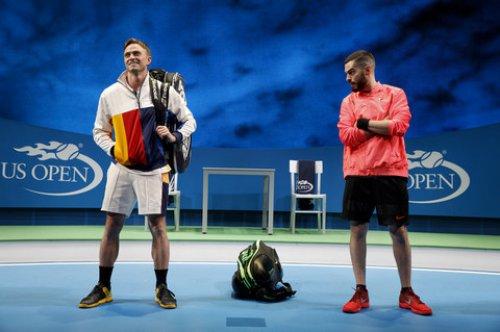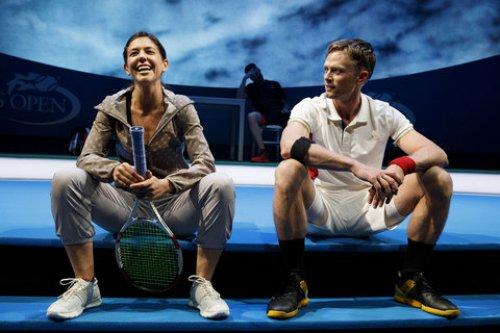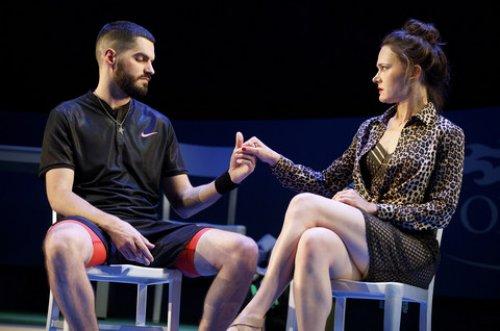The Last Match
Viable performers in a so-so script that shows two tennis pros playing a match along with other aspects of their lives via their thoughts and feelings.

Wilson Bethel and Alex Mickiewicz in a scene from “The Last Match” (Photo credit: Joan Marcus)
[avatar user=”David Kaufman” size=”96″ align=”left”] David Kaufman, Critic[/avatar]A decade after the dismal Deuce opened on Broadway, New York theater has a new play about tennis pros, Anna Ziegler’ The Last Match, at the Roundabout’s Laura Pels Theatre. Though it has nothing of the star-power of Terrence McNally’s Deuce, which featured Angela Lansbury and Marian Seldes, The Last Match has entirely viable performers in a so-so play that shows the pros playing a match while other aspects of their lives enter onto the stage, via their thoughts and feelings–and their women.
With so many interruptions, it hardly makes for riveting theater, and it never becomes as riveting as a genuine tennis match can be, even though one is ostensibly taking place from the beginning of the play to the end, which essentially presents a chronological series of sets between the two players, the Russian Sergei (Alex Mickiewicz) and the American Tim (Wilson Bethel).
From the beginning, the cheers and the roar of the offstage crowd and the flashing lights of the offstage cameras let us know that we’re at the arena with them. And Ziegler’s play literally seems to put the two players in each other’s head. When, in the beginning, Sergei says, “I can feel every tingle in every tingly spot in my body,” Tim more or less replies, “That is Sergei for you. Really no more than a boy.”

Zoë Winters and Wilson Bethel in a scene from “The Last Match” (Photo credit: Joan Marcus)
During this “semifinals of the U.S. Open,” the thirty-something Tim is being challenged by a rival who’s a decade younger than he is. If nothing else, The Last Match is a constant reminder that professional tennis players are compelled to retire early, given the grueling wear and tear the sport has on their aging bodies. As Tim’s wife Mallory (Zoë Winters) reassures him: “I will love you when you’re actually old. When no one talks about you on TV anymore.” But the bigger problem is that we don’t really care enough about him or about his whitebread persona or understand why anyone is talking about him now.
For her part, Sergei’s girlfriend Galina (Natalia Payne) is somewhat more critical of her boyfriend, telling him, “When you start to think you undo yourself. Thinking is not your strength.” And unfortunately, we come to agree with her. This is in spite of Mickiewicz’s muscular and athletic performance, which can seem, at times, over the top if not over the net. (As Sergei himself says, in Mickiewicz’s thick Russian accent, “The good thing about Russians is they are very loud.”)
With large scoreboards on both sides of the auditorium marking the players’ progress–or lack of same–it’s hard not to agree with Mallory when she says that tennis is “just relentless and boring.” And Mallory had herself been a tennis-pro: according to Tim, she was “one of the top twenty players in the whole world.” Also according to Tim, it’s Sergei who is now “the best fucking tennis player in the world.” Payne is an appropriately strong Galina, Winters a fine Mallory, and Bethel an aptly bland Tim.

Alex Mickiewicz and Natalia Payne in a scene from “The Last Match” (Photo credit: Joan Marcus)
To the play’s benefit, director Gaye Taylor Upchurch provides a certain continuous or cinematic movement to the staging. But it can’t overcome the tedium of having Sergei and Tim constantly describing what they’re doing as well as what they’re feeling. If in his wonderful poem Ars Poetica, Archibald McLeish conjectured that “A poem should not mean but be,” the same could be said about plays, and about this one in particular.
Though there’s not much to be said for Tim Mackabee’s static blue-sky and lawn-green set design, Bray Poor’s sound effects are, in a word, effective: the constant pinging of the rackets against the invisible balls, the “whoosh” they make as they fly through the air. And Montana Blanco’s costumes are always, in a word, suitable. But given the lackluster impact of The Last Match, and with the dreary Deuce not-too-distant a memory, it would seem that tennis should be shunned by playwrights as a subject for the stage.
The Last Match (through December 24, 2017)
Roundabout Theatre Company
Harold and Miriam Steinberg Center for Theatre
Laura Pels Theatre, 111 West 46th Street, in Manhattan
For tickets, 844-379-0370 or visit http://www.laurapelstheatre.ticketoffices.com
Running time: 95 minutes without an intermission






Leave a comment